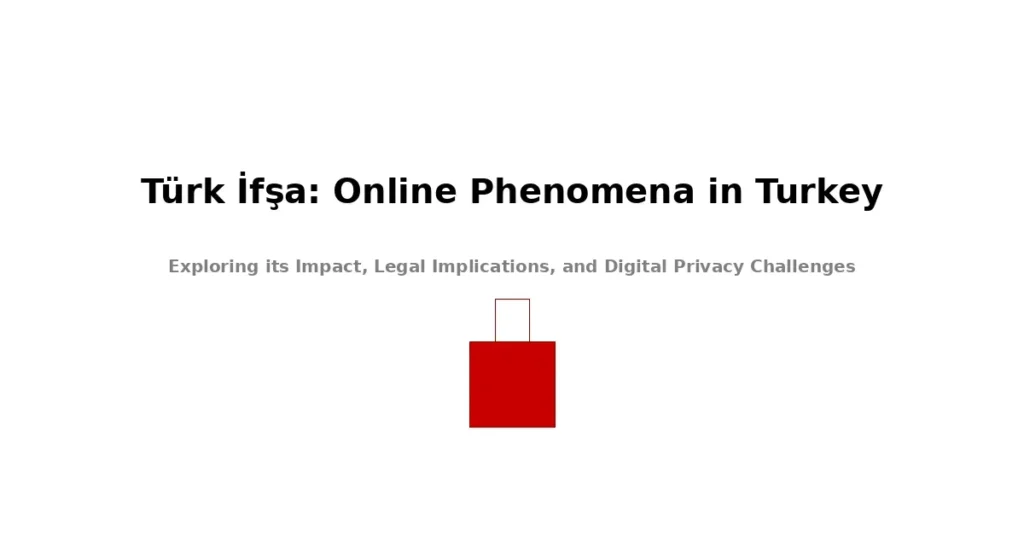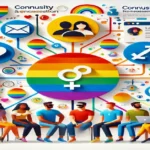The term “Türk ifşa” has emerged prominently within the online landscape of Turkey, particularly in social media and internet forums. This phenomenon, translating roughly to “Turkish expose” or “reveal,” is associated with sharing private or sensitive information, images, or videos often without consent. This article delves into the concept, its origins, impact, legal implications, and the broader ethical considerations it entails.
Understanding ‘Türk İfşa’: What Does It Mean?
Türk ifşa refers to the unauthorized disclosure of private or sensitive material. While the term is not unique to Turkey, its cultural and societal implications differ depending on the context. The term has been used in several contexts, such as:
- Personal Vendettas: Sharing content to defame or embarrass individuals due to personal grudges or disputes.
- Entertainment or Sensationalism: Posting material for shock value or attention.
- Revenge Porn: A highly invasive form of Türk ifşa where intimate photos or videos are shared maliciously after a breakup or conflict.
- Social Commentary: Rarely, Türk ifşa is used for whistleblowing purposes, where individuals expose corruption, malpractice, or other socially harmful behaviors.
The rise of social media platforms has made Türk ifşa a widespread and deeply concerning issue in Turkey. As it involves both privacy violations and ethical dilemmas, its increasing prevalence raises questions about its causes, consequences, and possible solutions.
Historical Background and Cultural Context
The phenomenon of ifşa is not new. Historically, societies have struggled with privacy violations, but the scale and speed of dissemination were limited before the internet era. In Turkey, the advent of platforms like Facebook, Instagram, Twitter, and TikTok brought unprecedented opportunities for information sharing—both positive and negative.
Culturally, privacy holds significant value in Turkish society. Yet, paradoxically, Türk ifşa highlights a conflict between traditional norms and modern technological freedoms. This paradox is particularly evident in how private lives are sometimes made public, drawing mass attention.
Several factors have contributed to Türk ifşa gaining traction:
- The Culture of Gossip: Historically, gossip has played a role in social regulation, with communities often sharing news, both positive and scandalous, about members.
- Media Sensationalism: Tabloids and gossip columns have normalized the public’s interest in private lives.
- Digital Anonymity: The perceived anonymity on the internet emboldens individuals to post content they would not share otherwise.
The Role of Social Media in Spreading Türk İfşa
Social media platforms play a pivotal role in amplifying Türk ifşa. The interconnectedness of users and the viral nature of content mean that private information can spread rapidly. Here are some key ways social media facilitates ifşa:
- Ease of Sharing: Platforms allow users to share content with a single click, reaching thousands or even millions instantly.
- Anonymity: Fake accounts make it easy for perpetrators to hide their identities.
- Monetization of Scandals: Some users profit from ifşa through increased followers, likes, or paid promotions linked to controversial content.
- Lack of Moderation: Platforms often struggle to detect and remove sensitive content promptly.
Types of Türk İfşa Content
The type of content shared under Türk ifşa varies widely. Some common categories include:
- Photos and Videos: Intimate or compromising images/videos are among the most commonly exposed.
- Personal Information: Addresses, phone numbers, and other private details may be shared maliciously.
- Text Messages or Chats: Screenshots of private conversations are often leaked to stir controversy.
- Financial Records: In some cases, bank statements or transaction histories are exposed.
Consequences of Türk İfşa
The effects of Türk ifşa can be devastating for individuals, families, and even communities. The consequences manifest in various forms:
1. Emotional and Psychological Impact
Victims often experience shame, anxiety, depression, or trauma. The public scrutiny and social judgment that accompany such exposure can significantly damage mental health.
2. Reputation Damage
Once personal content is leaked online, it becomes nearly impossible to remove it entirely. This permanent digital footprint can harm an individual’s reputation, affecting personal relationships and professional opportunities.
3. Legal Ramifications
Sharing private material without consent is a criminal offense under Turkish law, leading to potential lawsuits, fines, and imprisonment. However, enforcement can be inconsistent.
4. Impact on Society
Türk ifşa creates a culture of fear, mistrust, and voyeurism, eroding societal norms and values. It also perpetuates gender-based violence, as women are disproportionately targeted.
Legal Framework and Protections Against Türk İfşa
Turkey has laws in place to address issues related to Türk ifşa, though enforcement remains a challenge. Key legislations include:
1. The Turkish Penal Code (TPC)
The TPC criminalizes acts like unauthorized recording, sharing, or dissemination of private information. Articles 134 and 135 of the code specifically address violations of privacy.
2. The Law on Protection of Personal Data (No. 6698)
This law regulates the collection, processing, and sharing of personal data, providing legal recourse for victims.
3. Cybercrime Legislation
Under the broader umbrella of cybercrime laws, individuals engaged in Türk ifşa can face penalties for hacking, defamation, or other related offenses.
4. International Treaties
Turkey is a signatory to various international conventions on human rights and privacy, which reinforce protections against privacy violations.
Despite these measures, challenges persist:
- Lack of awareness about legal rights and protections.
- Difficulty in identifying perpetrators due to anonymity.
- Slow judicial processes and limited technical expertise in handling digital evidence.
Ethical Considerations and Societal Responsibility
Türk ifşa raises profound ethical questions about privacy, consent, and the role of technology in modern society. Key considerations include:
- Privacy vs. Public Interest Is it ever justified to expose private information for the greater good? While whistleblowing serves a societal purpose, most ifşa cases lack such justification.
- The Role of Technology Companies Platforms that host such content bear a significant responsibility. Stronger moderation policies, better reporting mechanisms, and stricter enforcement are essential.
- Educating the Public Raising awareness about the importance of digital privacy and the consequences of Türk ifşa is crucial in fostering a more responsible online culture.
- Gender Dynamics Women are disproportionately affected by Türk ifşa. Addressing gender-based violence in both digital and offline contexts is a societal imperative.
Combatting Türk İfşa: What Can Be Done?
A multi-pronged approach is essential to combat Türk ifşa effectively:
1. Strengthening Legal Mechanisms
- Faster judicial processes for victims seeking justice.
- Enhanced cybercrime units with trained professionals.
- International collaboration to tackle cross-border privacy violations.
2. Technological Solutions
- AI-driven tools to detect and remove sensitive content.
- Stronger encryption and privacy settings on social media platforms.
- Anonymous reporting mechanisms for victims.
3. Awareness Campaigns
- Educational programs on digital rights and online safety.
- Public service announcements targeting common misconceptions about privacy.
4. Community Accountability
- Encouraging ethical behavior and empathy online.
- Holding influencers, content creators, and media outlets accountable for promoting harmful content.
Case Studies and Real-World Examples
Examining specific instances of Türk ifşa helps to understand its real-world impact:
Case 1: Celebrity Scandals
Numerous Turkish celebrities have fallen victim to ifşa, with their private photos or messages leaked online. While these cases often attract significant media attention, they highlight the vulnerability of even the most influential individuals.
Case 2: Revenge Porn
A common form of Türk ifşa involves former partners leaking intimate material as an act of revenge. The victims—predominantly women—face severe social stigma, while the perpetrators often escape accountability.
Case 3: Whistleblowing
In rare cases, Türk ifşa is used to expose corruption or unethical practices, sparking debates about the balance between privacy and accountability.
The Future of Türk İfşa in a Digital World
As technology continues to evolve, Türk ifşa is likely to remain a pressing issue. However, there is hope for progress through collective efforts from individuals, communities, governments, and corporations. A culture that respects privacy, values consent, and promotes digital literacy can help mitigate the phenomenon.
Conclusion
Türk ifşa is a multifaceted issue that intertwines cultural norms, technological advancements, and ethical dilemmas. While the internet offers unparalleled opportunities for connection and information sharing, it also exposes vulnerabilities that must be addressed collectively. By strengthening legal frameworks, fostering ethical online behavior, and leveraging technology responsibly, society can take meaningful steps to combat Türk ifşa and protect individual privacy.
FAQs
1. What is Türk ifşa?
Türk ifşa refers to the unauthorized sharing of private or sensitive information, images, or videos in Turkey, often on social media platforms, without the consent of the individuals involved.
2. Is Türk ifşa illegal in Turkey?
Yes, Türk ifşa is illegal under Turkish law. Articles 134 and 135 of the Turkish Penal Code, along with the Law on Protection of Personal Data, provide legal recourse for victims.
3. What are the consequences of Türk ifşa for victims?
Victims may face emotional distress, reputational damage, and social stigma. The permanent nature of online content can exacerbate these effects.
4. How can individuals protect themselves from Türk ifşa?
Individuals can protect themselves by:
- Using strong privacy settings on social media.
- Avoiding sharing sensitive information online.
- Reporting unauthorized content promptly.
5. What role do social media platforms play in Türk ifşa?
Social media platforms facilitate the spread of ifşa by providing easy sharing mechanisms and inadequate moderation. Platforms need to implement stricter policies and better tools to address privacy violations.
6. How can society combat Türk ifşa?
Society can combat Türk ifşa through:
- Strengthened legal protections and enforcement.
- Technological solutions like AI moderation tools.
- Public awareness campaigns on digital rights and privacy.







